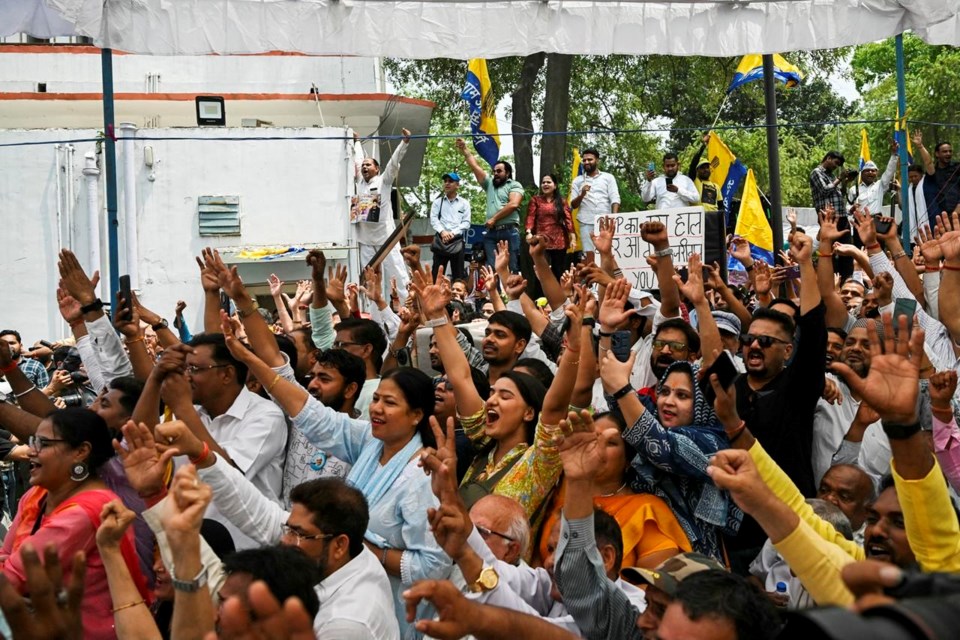Los Angeles/DNA — The world has taken a small step backward on the path of democracy since 2010, according to a global index being released this week by an international group of governance researchers.
The 2024 Berggruen Governance Index (BGI) shows slippage of measurable benchmarks of democratic accountability across 145 countries — from a 2010 average of 67 on a 100-point scale to 65 points in 2021. The global average had risen from 64 to 67 points during 2000-2010.
The 96-page report, titled “Democracy Challenged,” is being unveiled Wednesday at the Luskin School of Public Affairs at the University of California, Los Angeles, which collaborated on the project with the Los Angeles-based Berggruen Institute and the Berlin-based Hertie School.
The finding of slippage in the BGI’s Democratic Accountability Index is only a small setback, which “tempers some of the more dire assessments about the future of democracy,” the authors wrote. The Democratic Accountability Index weighs the influence of citizens and institutions on governments.
Democracy in decline in India and China
India, which had been stable as the world’s most populous democracy in 2010, has since dipped from a score of 80 to 62 points on the democracy index under Prime Minister Narendra Modi’s “increasing strongman rule,” the report said. China slipped from 28 points in 2010 to 20 points by 2021 — fourth-lowest in the world — under President Xi Jinping more hardline leadership. The two Asian giants together have nearly 35 percent of the world’s population.
Other countries with some of the largest declines in the democracy index are Venezuela, Thailand, Turkey, Yemen and Russia. In the European Union, Poland and Hungary saw significant backsliding through 2021, according to the report. The new ruling coalition in Poland, where a right-wing populist government accused of undermining democratic standards was defeated in 2023 elections, shows “the potential for the democratic renewal of illiberal regimes,” the report said.
US struggles with democratic accountability and state capacity
The United States, which had risen from 91 to 95 points in the decade through 2010, has since fallen back to 86 on the democracy index. State capacity in the US is also sliding, from a steady 79 points in 2010 to 64 in 2021, yet on the public goods index, the country has steadily climbed from 84 points in 2000 to 87 in 2021.
The 10 most improved countries in democratic accountability include four in Africa — Tunisia, Gambia, Liberia and Libya — plus Peru, Armenia, Bhutan, Iraq, Myanmar and Afghanistan. But most remain well short of full democracies, and Tunisia, Libya, Myanmar and Afghanistan have likely seen much of their gains erased by unrest and conflict since 2021.
----------------------------------------------------------------------------------
This text and the accompanying photo are an offer from the Democracy News Alliance, a close co-operation between Agence France-Presse (AFP, France), Agenzia Nazionale Stampa Associata (ANSA, Italy), The 91‘≠¥¥ Press (CP, Canada), Deutsche Presse-Agentur (dpa, Germany) and PA Media (PA, UK). All recipients can use this material without the need for a separate subscription agreement with one or more of the participating agencies. This includes the recipient's right to publish the material in own products.
The DNA content is an independent journalistic service that operates separately from the other services of the participating agencies. It is produced by editorial units that are not involved in the production of the agencies' main news services. Nevertheless, the editorial standards of the agencies and their assurance of completely independent, impartial and unbiased reporting also apply here.
The 91‘≠¥¥ Press



